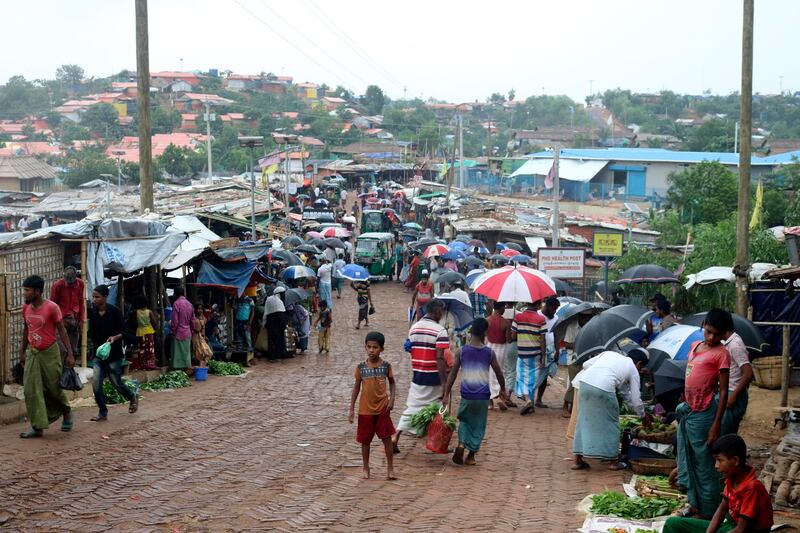Myanmar’s junta is planning 15 new villages with 750 plots of farmable land in Rakhine state as part of a pilot program that would see 1,500 ethnic Rohingyas repatriated from refugee camps in neighboring Bangladesh next month.
Pro-junta media reported Thursday that returnees will be screened and accepted at the Taung Pyo Letwe and Ngar Khu Ya refugee camps in Maungdaw township as part of the pilot program, before they are sent to the Hla Pho Khaung interim camp for two months.
Afterwards, the returnees will be resettled in the planned villages, which will be fitted with basic infrastructure ahead of their arrival, reports said, citing junta chief for Rakhine state Htin Lin.
Rohingyas in Bangladesh have expressed their desire to return home to Myanmar – from which they fled amid military crackdown starting in 2017 – but are adamant that they will only do so if they can go back to their original locations and are guaranteed the right to citizenship, freedom of travel and equal rights with other ethnicities.
People “have a lot of doubts” about the intentions of the junta’s pilot program, said Khin Maung, director of the Rohingya Youth Association in Cox’s Bazar, where about 1 million refugees from the persecuted Rohingya minority live in squalid camps.
“If they are being honest to the refugees, they must resettle them in their original locations and give them equal rights as citizens,” he said.
“But they have not mentioned anything about such issues,” Khin Maung said. “That’s why I think they are only trying to implement their project to build a good international reputation for themselves.”
On Wednesday, a 17-member delegation from Myanmar led by the junta’s Rakhine State Immigration Minister Myo Aung returned from Bangladesh where it had been interviewing Rohingya families for the pilot program. Junta Deputy Minister of Information Major Gen. Zaw Min Tun said the pilot program could begin as early as mid-April, Agence France-Presse reported.

The junta said Thursday that it plans to accept another 5,000 returnees from 1,500 households if the pilot project is successfully implemented.
Attempts by RFA to contact junta officials about the pilot program went unanswered Friday.
Returning to conflict
The junta’s announcement that it will build new villages for returnees comes days after the United Nations High Commissioner for Refugees said its repatriation plan is “not conducive to the sustainable return of Rohingya refugees” according to the current unstable situations in Myanmar and in Rakhine state.
Myanmar is rife with conflict in the aftermath of the military’s Feb. 1, 2021 coup d’etat and is mired in a humanitarian crisis involving some 1.7 million people displaced by violence throughout the country, according to a recent estimate by the U.N.
Despite the UNHCR’s concerns over the pilot program, the UN refugee agency acknowledged in a statement earlier this week that it transported junta officials aboard unmarked UN boats to Bangladeshi refugee camps last week, a move that has been criticized as risky to humanitarian workers and a “serious breach” of U.N. neutrality.
According to the statistics collected by RFA, nearly 2,000 Rohingyas have been arrested on their way to Malaysia from refugee camps in Rakhine state and Bangladesh from December 2021 to March 2023.
The junta has sentenced nearly 500 of them to two to five years in prison under Myanmar’s immigration law.
Rohingyas at the Thae Chaung Rohingya refugee camp in Rakhine's Sittwe township say they have no employment opportunities and rely on 500 kyats (U.S.$0.25) per person per day, supplied by the World Food Program.
Some 14,000 refugees have lived in the camp for more than a decade following ethnic violence in Rakhine state in 2012 and many have sold all of their possessions and risked their lives traveling to Malaysia and other Muslim majority countries in search of new opportunities. Some have died or disappeared during the journey, while others endure abuse at the hands of brokers or have been imprisoned along the way.
Translated by Myo Min Aung. Edited by Joshua Lipes and Malcolm Foster.
